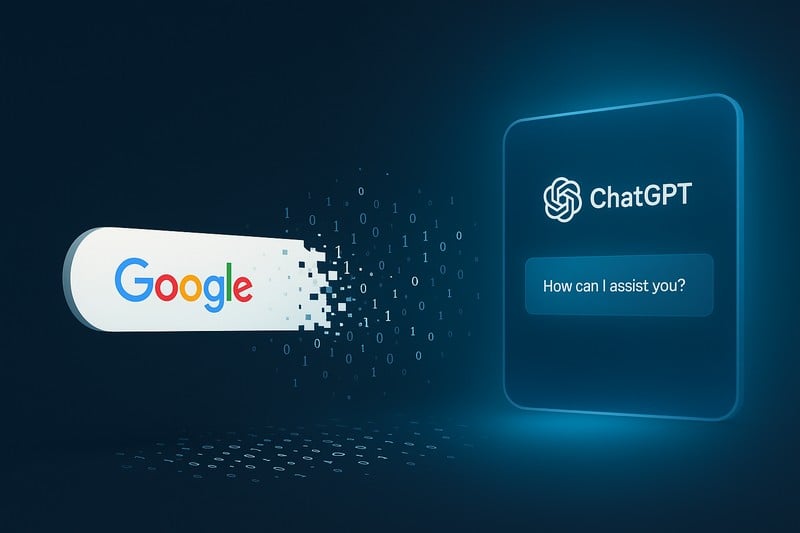1 min read
A Comprehensive Guide to AI Search Content Optimization
Creating content that thrives in an AI-driven search landscape requires a strategic blend of SEO optimization fundamentals and new approaches...
7 min read
Stuart Meyler Co-Founder Principal : May 13, 2025

The other night, my wife ran into the room and exclaimed excitedly:
“I love ChatGPT, she (my wife, interestingly, refers to ChatGPT as “she”) just helped me make a better version of a sesame cookie!”
She wasn’t joking about her newly professed love. And she wasn’t joking about the cookie. It was fantastic.
She’d started using ChatGPT for recipes for some catering work and had found it infinitely more helpful than Google, which would have been her usual go-to. And in that moment, I smirked—not out of surprise, but out of recognition.
I've been ahead of this particular curve for months. Our agency has been experimenting with various forms of AI and its close cousin, RPA/RAG, for the past few years. Since ChatGPT opened in November 2022, we have embraced it entirely as an agency working to use it in our day-to-day work and even undergoing agency-wide training and certification to help employees better understand how to use LLMs and GPTs and incorporate them into their work lives. We even re-engineered our workflow to take advantage of AI, launching our AI-enabled process for scaling digital performance media, VentasAI.
So, what had initially felt like novelty had, for me personally and professionally, evolved into utility. I no longer searched. With ChatGPT, I asked, conversed, and, most importantly, found and solved. So, I could appreciate my wife’s Eureka moment.
Information, solutions, and ideas.
I don’t get excerpts and links, I get synthesis. I don't click on links looking for a website to find an answer. The answers come to me in great, stunning (and sometimes inaccurate) detail.
“Searching” seems like a quaint term for this new (and exciting) form of interaction. It also reminds me of something a senior Google search engineer once told me: "Searching is bad. Finding is good."
As my wife discovered, with AI-based solutions like ChatGPT, there is a lot more finding and, potentially, less searching. And that spells potential trouble for Google, a company whose business is based on searching. A lot of searching.
For all its dominance, Google increasingly feels like trying to find a song on an 8-track tape or pop a VCR tape to watch a movie. In other words, searching feels a bit…. antiquated.
It's like something your Uncle Rico might have in his 1982 280Z. He might swear by the sound, but to most people, it just seems kind of outdated.
 Unlike the 8 Track, Google has and does still offer pretty good technology when it comes to information utility: Search, Maps, Gmail, YouTube, Shopping, and Play.
Unlike the 8 Track, Google has and does still offer pretty good technology when it comes to information utility: Search, Maps, Gmail, YouTube, Shopping, and Play.
Google has a wide and varied digital ecosystem, and, unlike the 8 Track, that system is unlikely to be undone overnight by a single superior technology like the cassette tape. However, searching, both as a behavior and the data that behavior provides, is at the core of Google's identity and offering.
So, what happens if people stop searching or start searching less? Well, one thing it means is fewer opportunities to reach them in the near term.
Longer term, Google’s understanding of them becomes less complete. Google knows less about me now than it used to because I search and interact less. Much less potentially due to solutions like ChatGPT.
I am much more likely to plug a LinkedIn URL into a custom meeting prep GPT than I am to Google someone before a meeting. Just a small example. There are dozens.
Am I an anomaly (don’t ask my wife please)?
We may not have to wait long to find the answer, and anyone marketing online in 2025 has already probably noticed increased competition for a slice of shrinking referral traffic from search engines like Google as “answer” search and AI snippets, along with Google’s own offerings, result in fewer search referrals to 3rd parties.
https://sparktoro.com/blog/2024-zero-click-search-study-for-every-1000-us-google-searches-only-374-clicks-go-to-the-open-web-in-the-eu-its-360/
https://www.similarweb.com/corp/blog/research/zero-click-google-search-2024/
https://www.axios.com/2024/05/17/google-openai-ai-generative-publishers
https://searchengineland.com/google-sge-impact-industry-436613
https://www.brightedge.com/google-sge
According to the data, the number of zero-click searches has been increasing. Up to 77% of searches on mobile devices in the U.S.! And with mobile device usage being the dominant form, that means most searches are not resulting in a click to your website already.
So, what does a poor digital marketer do?
This is not the article that tells you how to compete more effectively on the SERPS for the dwindling and increasingly rare clicks to your website. You will need to do that, sure enough, but even doing that successfully will not be enough to drive growth moving forward.
Eddie Cue, Apple’s SVP of Services, said something stunning this week during the DOJ’s antitrust trial against Google that should cause any digital marketer to sit up in their chair:
His explanation? The rise of generative AI tools like ChatGPT and Perplexity.
This wasn’t an academic insight—it was a data-driven signal that consumer behavior in digital media is changing fundamentally.
Search has been our interface with the web and internet for the past 25+ years. It is how we interact, how we find things and people, and how we start our workday and, in many cases, our days off. It is integral to how we live in the modern era. Entire businesses are predicated on this behavior, probably including yours. But now people are changing how they interface with information. They are not using a search box as much, or, in my case, at all, to do it.
Google built its empire on a single, brilliant interface: the search bar. It turned the messy sprawl of the internet into something navigable—so long as users were willing to parse ads, click links, and do some of the work, they had access to a cornucopia of information.
 Google may have sorted it, but the user still had to look through it, understand it, know how to apply it, and leverage it. Much of that latter work, along with the finding, is now done by LLMs like ChatGPT.
Google may have sorted it, but the user still had to look through it, understand it, know how to apply it, and leverage it. Much of that latter work, along with the finding, is now done by LLMs like ChatGPT.
AI doesn’t ask users to search. It just responds. It does the work for you in many cases. As consumers get better at prompts and learn to set up custom GPTs and other easy-to-build tools, searching becomes something that just happens organically, within the larger process, not the activity itself.
If you are building an app, the information comes to you as needed, the search happening in the background using "anticipatory cognition" to deliver updated code snippets. No need to input a search term.
In the process, AI-native tools are reshaping consumer expectations regarding how they interact with the internet and internet content. Today, it is easy to make a simple GPT to turn recipes into healthier versions of themselves or other tools to make navigating and using all of the available digital information more effective. Combined with agentic AI services, consumers will be served by "information" concierges and agents that anticipate their needs and act on them, cutting out the searching process entirely.
The winners of the next chapter of digital marketing won't be the best at keyword ranking or SEO —they’ll be the ones who have found ways to make their brands and associated content instantly useful in a conversation, seamlessly accessible through chat, voice, or virtual agents. Can you help consumers solve problems in ways that complement your brand mission? To do that, you need to understand their real problems and not a collection of keywords.
Digital marketers must come to grips with the reality: SEO, as we know it, is in decline. It is not irrelevant, but adjacent to larger overall efforts at attracting and converting customers. Search is not dead. But if your strategy is entirely search-dependent, well, you might be. That is because a search-only or search-centric strategy is not a growth-oriented one in 2025. Search will be around, but the apex of search as a behavior and as the digital marketing king of the mountain has passed.
So, if not SEO and search, what should marketers focus on as AI evolves and develops?
Pay close attention to how consumers use tools like ChatGPT, Perplexity, and Midjourney. Can your brand or product add value to what they are already doing? Can you help them discover new ways of using these tools that help to build brand favorability?
Keeping some simple things at the top of your mind can help you maintain focus on executing more effective strategies for the age of AI in digital marketing. Many of these are generally good practices for content marketing and SEO, so that is the good news.
Just as the 8-track didn’t vanish in a day, Google won’t either. But habits are shifting. If Apple is noticing search volumes falling, that’s not just a crack in the foundation—it’s a canary in the coal mine moment that we as digital marketers need to pay close attention to.
Google has been around since 1998. They dominate search, display, video, and consumer utilities like apps, maps, email, and communications. They are a leader in AI research and development and have made significant forays into AI solutions in their own right. But they are also under some pressure. Ironically, their core business is under pressure from the DOJ at a time when they may be facing their first real competition in years.
As is not unusual, anti-trade is focused on fighting yesterday's battle. In fast-moving technology, circles, a simple chip or piece of code can often undo what armies of regulators are unable to -- breaking monopoly power.
For marketers, the important thing is that consumer trends move quickly. There is no cost to use Google, which is good news but also bad news. There is no cost to leave it, either. Consumers will and are embracing AI tools to make their lives easier. Some of them will embrace Google’s version of it, but many others won’t. Early numbers and past history say that new players will emerge that are better suited to address the newly emerging needs of this audience.
And if you are like my wife, you are increasingly leaving Google for someone who understands you better, listens more carefully, and anticipates your needs more completely.
Come to think of it, I may need to do some research on my own….

1 min read
Creating content that thrives in an AI-driven search landscape requires a strategic blend of SEO optimization fundamentals and new approaches...

1 min read
If you haven't yet, pause and check out ourComprehensive Guide to Content Optimization for AI Search. This part isn’t rocket science…Your content is...